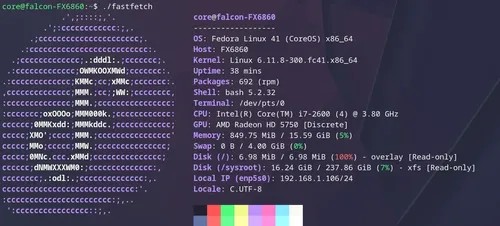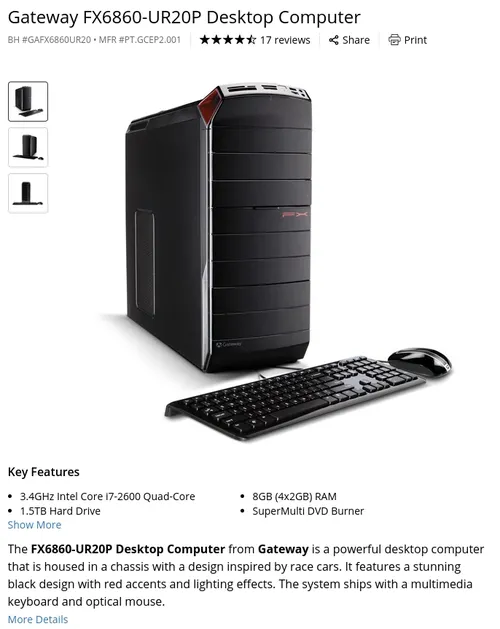Tags
I just setup my oldest hardware on the newest hotest server distro ucore-zfs. This is a gateway FX6860 manufactured in 2010.
Immutable is the future #
My current boot log shows that I first started daily driving bazzite back in August 2024. I've been hapily using it since my arch install was plaugued with a crippling display driver error, or something that would lock the display for minutes every 30s or so, it became unusable. I switched because this is what I put my son on and it was working great for him.
waylon@razorcrest:~$ journalctl --list-boots IDX BOOT ID FIRST ENTRY LAST ENTRY -19 7e6e154d2609407da24fa12814eadbd7 Thu 2024-08-29 16:15:15 CDT Thu 2024-08-29 17:37:25 CDT
Four months later and I am really loving the immutable distro experience. My base system gets fresh reliable updates, and I barely install anything directly on it, a handful of things are snaps or flatpaks from the discover store, but my main workflow is now in distrobox. It has been rock solid reliable, and just works.
The Hardware #
This gem is running a an intel i7-2600 (4) @ 3.80 ghz with 16gb of ram. I've maxed out the ram that the motherboard will allow me. I may have even forgot about this limitation and ordered a 2x32gb setup for it and it did nothing. That's now sitting in my new k3s master node.
Here's a B&H photo post of the machine, she is big and heavy but still working.
I'm a big fan of keeping these old machines running and avoiding the e-waste pile, great for running a home lab. Admittedly this is one is probably on its last leg, dell optiplexes are pretty cheap and run circles around this one, so this one is become my experimental setup for trying new things like core-os.
Get Password Hash #
We will need to create a password hash for the root user to put into our ignition file.
podman run -ti --rm quay.io/coreos/mkpasswd --method=yescrypt Password: $y$j9T$0ZsoVynV7y0Z7/l6588Ba1$VZT0uCGP0CnYSX/EArCvYMuo3q.gnyOnk1RO6.HDNDB
Get SSH Pub Key #
Generate an ssh key using the ssh-keygen command.
$ ssh-keygen -t ed25519 -C "[email protected]" Generating public/private ed25519 key pair. Enter file in which to save the key (/var/home/core/.ssh/id_ed25519): Enter passphrase (empty for no passphrase): Enter same passphrase again: Your identification has been saved in /var/home/core/.ssh/id_ed25519 Your public key has been saved in /var/home/core/.ssh/id_ed25519.pub The key fingerprint is: SHA256:xVJAVreKVILOnxTDxK88RyMwhdDCBMnjMSGU7rsAqwQ [email protected] The key's randomart image is: +--[ED25519 256]--+ |oo+*oo OBo+ . | | o* o *.== . . | |.. + + oo+o . | | .. o.o++. | |E +S=.. | |oo * . | |o.. o | |+. | |... | +----[SHA256]-----+
Now copy your public key into the ignition file from your local machine
$ cat ~/.ssh/id_ed25519.pub ssh-ed25519 AAAAC3NzaC1lZDI1NTE5AAAAIPY73r4EU9wm/26/rTpx/uvAyInmbQ/k+l04eadSahD0 [email protected]
ucore-autorebase.butane #
I got my ignition file from ucore/ucore-autorebase. Put my secret values into it and used it.
https://github.com/ublue-os/ucore/blob/main/examples/ucore-autorebase.butane
variant: fcos version: 1.4.0 passwd: users: - name: core ssh_authorized_keys: - ssh-ed25519 AAAAC3NzaC1lZDI1NTE5AAAAIPY73r4EU9wm/26/rTpx/uvAyInmbQ/k+l04eadSahD0 [email protected] password_hash: $y$j9T$0ZsoVynV7y0Z7/l6588Ba1$VZT0uCGP0CnYSX/EArCvYMuo3q.gnyOnk1RO6.HDNDB storage: directories: - path: /etc/ucore-autorebase mode: 0754 systemd: units: - name: ucore-unsigned-autorebase.service enabled: true contents: | [Unit] Description=uCore autorebase to unsigned OCI and reboot ConditionPathExists=!/etc/ucore-autorebase/unverified ConditionPathExists=!/etc/ucore-autorebase/signed After=network-online.target Wants=network-online.target [Service] Type=oneshot StandardOutput=journal+console ExecStart=/usr/bin/rpm-ostree rebase --bypass-driver ostree-unverified-registry:ghcr.io/ublue-os/ucore:stable ExecStart=/usr/bin/touch /etc/ucore-autorebase/unverified ExecStart=/usr/bin/systemctl disable ucore-unsigned-autorebase.service ExecStart=/usr/bin/systemctl reboot [Install] WantedBy=multi-user.target - name: ucore-signed-autorebase.service enabled: true contents: | [Unit] Description=uCore autorebase to signed OCI and reboot ConditionPathExists=/etc/ucore-autorebase/unverified ConditionPathExists=!/etc/ucore-autorebase/verified After=network-online.target Wants=network-online.target [Service] Type=oneshot StandardOutput=journal+console ExecStart=/usr/bin/rpm-ostree rebase --bypass-driver ostree-image-signed:docker://ghcr.io/ublue-os/ucore:stable ExecStart=/usr/bin/touch /etc/ucore-autorebase/signed ExecStart=/usr/bin/systemctl disable ucore-signed-autorebase.service ExecStart=/usr/bin/systemctl reboot [Install] WantedBy=multi-user.target butane
Creating an ignition file #
podman run --interactive --rm --security-opt label=disable \ --volume ${PWD}:/pwd --workdir /pwd quay.io/coreos/butane:release \ --pretty --strict ucore-autorebase.butane >transpiled_config.ign
Getting zfs #
Now this is where I realized I went wrong and wished I would have paid attention to the autorebase.butane file, it did not use the zfs flavor ucore. Luckily they make it wildly easy to rebase between these base images.
I needed to run this to rebase into the zfs flavor.
/usr/bin/rpm-ostree rebase --bypass-driver ostree-unverified-registry:ghcr.io/ublue-os/ucore:stable-zfs
This was the output.
core@falcon-FX6860:~$ /usr/bin/rpm-ostree rebase --bypass-driver ostree-unverified-registry:ghcr.io/ublue-os/ucore:stable-zfs ==== AUTHENTICATING FOR org.projectatomic.rpmostree1.rebase ==== Authentication is required to switch to a different base OS Authenticating as: CoreOS Admin (core) Password: ==== AUTHENTICATION COMPLETE ==== Pulling manifest: ostree-unverified-registry:ghcr.io/ublue-os/ucore:stable-zfs Importing: ostree-unverified-registry:ghcr.io/ublue-os/ucore:stable-zfs (digest: sha256:8ebae90f6844949044c026d7ba05c035956992b68e13bdcbd9158a37beda571e) ostree chunk layers already present: 51 custom layers needed: 2 (492.9 MB) Fetching layer sha256:67f3c0e0e0fe (269.7 MB)... done Fetching layer sha256:25992805e895 (223.1 MB)... done Staging deployment... done Upgraded: cockpit-bridge 330-1.fc41 -> 331-1.fc41 cockpit-networkmanager 330-1.fc41 -> 331-1.fc41 cockpit-selinux 330-1.fc41 -> 331-1.fc41 cockpit-storaged 330-1.fc41 -> 331-1.fc41 cockpit-system 330-1.fc41 -> 331-1.fc41 Added: groff-base-1.23.0-7.fc41.x86_64 kmod-zfs-2.2.7-1.fc41.x86_64 libnvpair3-2.2.7-1.fc41.x86_64 libuutil3-2.2.7-1.fc41.x86_64 libzfs5-2.2.7-1.fc41.x86_64 libzpool5-2.2.7-1.fc41.x86_64 lm_sensors-libs-3.6.0-20.fc41.x86_64 lzop-1.04-15.fc41.x86_64 mbuffer-20241007-1.fc41.x86_64 perl-AutoLoader-5.74-512.fc41.noarch perl-B-1.89-512.fc41.x86_64 perl-Capture-Tiny-0.48-21.fc41.noarch perl-Carp-1.54-511.fc41.noarch perl-Class-Struct-0.68-512.fc41.noarch perl-Config-IniFiles-3.000003-14.fc41.noarch perl-Data-Dumper-2.189-512.fc41.x86_64 perl-Digest-1.20-511.fc41.noarch perl-Digest-MD5-2.59-5.fc41.x86_64 perl-DynaLoader-1.56-512.fc41.x86_64 perl-Encode-4:3.21-511.fc41.x86_64 perl-Errno-1.38-512.fc41.x86_64 perl-Exporter-5.78-511.fc41.noarch perl-Fcntl-1.18-512.fc41.x86_64 perl-File-Basename-2.86-512.fc41.noarch perl-File-Path-2.18-511.fc41.noarch perl-File-Temp-1:0.231.100-511.fc41.noarch perl-File-stat-1.14-512.fc41.noarch perl-FileHandle-2.05-512.fc41.noarch perl-Getopt-Long-1:2.58-2.fc41.noarch perl-Getopt-Std-1.14-512.fc41.noarch perl-HTTP-Tiny-0.090-1.fc41.noarch perl-IO-1.55-512.fc41.x86_64 perl-IO-Socket-IP-0.43-1.fc41.noarch perl-IO-Socket-SSL-2.089-1.fc41.noarch perl-IO-stringy-2.113-15.fc41.noarch perl-IPC-Open3-1.22-512.fc41.noarch perl-MIME-Base32-1.303-21.fc41.noarch perl-MIME-Base64-3.16-511.fc41.x86_64 perl-NDBM_File-1.17-512.fc41.x86_64 perl-Net-SSLeay-1.94-7.fc41.x86_64 perl-POSIX-2.20-512.fc41.x86_64 perl-PathTools-3.91-511.fc41.x86_64 perl-Pod-Escapes-1:1.07-511.fc41.noarch perl-Pod-Perldoc-3.28.01-512.fc41.noarch perl-Pod-Simple-1:3.45-511.fc41.noarch perl-Pod-Usage-4:2.03-511.fc41.noarch perl-Scalar-List-Utils-5:1.68-1.fc41.x86_64 perl-SelectSaver-1.02-512.fc41.noarch perl-Socket-4:2.038-511.fc41.x86_64 perl-Storable-1:3.32-511.fc41.x86_64 perl-Symbol-1.09-512.fc41.noarch perl-Sys-Hostname-1.25-512.fc41.x86_64 perl-Term-ANSIColor-5.01-512.fc41.noarch perl-Term-Cap-1.18-511.fc41.noarch perl-Text-ParseWords-3.31-511.fc41.noarch perl-Text-Tabs+Wrap-2024.001-511.fc41.noarch perl-Time-Local-2:1.350-511.fc41.noarch perl-URI-5.30-1.fc41.noarch perl-base-2.27-512.fc41.noarch perl-constant-1.33-512.fc41.noarch perl-if-0.61.000-512.fc41.noarch perl-interpreter-4:5.40.0-512.fc41.x86_64 perl-libnet-3.15-512.fc41.noarch perl-libs-4:5.40.0-512.fc41.x86_64 perl-locale-1.12-512.fc41.noarch perl-mro-1.29-512.fc41.x86_64 perl-overload-1.37-512.fc41.noarch perl-overloading-0.02-512.fc41.noarch perl-parent-1:0.242-1.fc41.noarch perl-podlators-1:6.0.2-2.fc41.noarch perl-vars-1.05-512.fc41.noarch pv-1.8.14-2.fc41.x86_64 python3-cffi-1.17.0-1.fc41.x86_64 python3-ply-3.11-25.fc41.noarch python3-pycparser-2.20-18.fc41.noarch python3-pyzfs-2.2.7-1.fc41.noarch sanoid-2.2.0-1.fc41.ucore2.noarch sysstat-12.7.6-2.fc41.x86_64 zfs-2.2.7-1.fc41.x86_64 zfs-dracut-2.2.7-1.fc41.noarch Changes queued for next boot. Run "systemctl reboot" to start a reboot
For some reason I double checked, and runnign it a second time gave me this.
core@falcon-FX6860:~$ sudo rpm-ostree rebase ostree-image-signed:docker://ghcr.io/ublue-os/ucore:stable-zfs Pulling manifest: ostree-image-signed:docker://ghcr.io/ublue-os/ucore:stable-zfs Staging deployment... done Changes queued for next boot. Run "systemctl reboot" to start a reboot
ZFS #
Once I rebooted I had all of my necessary zfs utilities that I needed.
connecting nfs #
The last thing I wanted to do was to mount an nfs share from my master node so that they can share a storage backend. I found that nfs was already in the host and ready to go.
sudo mkdir /mnt/vault/nfs sudo mount -t nfs <nfs server ip>:/mnt/vault/nfs /mnt/vault/nfs


